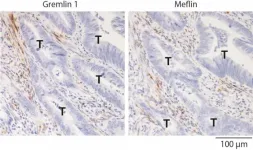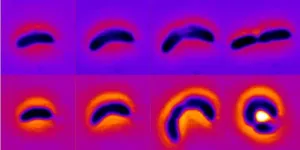LCMC3: Neoadjuvant atezolizumab safe, meets primary endpoint of pathologic response rate
Research presented at the International Association for the Study of Lung Cancer's World Conference on Lung Cancer
2021-01-30
(Press-News.org) (Singapore--January 30, 2021 11:00 p.m. SPT/January 30, 2021 10:00 a.m. EST)-- Primary analysis of the Lung Cancer Mutation Consortium (LCMC) 3 study revealed that neoadjuvant atezolizumab prior to lung cancer surgery was well tolerated by patients and met its primary endpoint of 20% major pathologic response rate, according to research presented today at the International Association for the Study of Lung Cancer's World Conference on Lung Cancer.
Dr. Jay M. Lee, chief, Division of Thoracic Surgery at Ronald Reagan UCLA Medical Center in Los Angeles, today reported on results from a study of 181 patients with stage IB to IIIB non-small cell lung cancer (NSCLC) who each received 1,200 mg of neoadjuvant atezolizumab intravenously every three weeks for two cycles followed by resection. Atezolizumab is a monoclonal antibody that was approved by the US Food and Drug Administration in 2020 for the first-line treatment of adult patients with metastatic NSCLC.
Dr. Lee reported earlier that small pilot studies (N Engl J Med. 2018;378:1976) have shown preoperative immune checkpoint inhibitor therapy may be of benefit in resectable NSCLC. Dr. Lee stated that "the LCMC3 study is the largest, monotherapy trial of checkpoint inhibition in resectable NSCLC and is a landmark study to compare future results."
Patients received neoadjuvant atezolizumab for two cycles, followed by resection between 30 and 50 days from the first cycle. Patients who benefitted from the therapy continued adjuvant atezolizumab for 12 months. The primary endpoint was major pathologic response (MPR; less than or equal to 10% viable tumor cells at surgery) in patients without EGFR or ALK mutations.
Of the 181 patients enrolled, the median age was 65 years; 51% were female, 90% were current/former smokers, and 62% had a nonsquamous histology. Patients were categorized in the following stages: 17 patients were staged at IB; 20 were IIA, 55 were IIB, 72 were IIIA, and 17 were IIIB.
In patients without EGFR/ALK mutations who underwent surgery, the major pathologic response rate was 21% (30/144; 95% CI: 14%-28%) and the pathologic complete response rate was 7% (10/144; 95% CI: 3%-12%).
"It is important to recognize that the preoperative and intraoperative unresectability rates in LCMC3 are comparable to historical neoadjuvant chemotherapy trials and should not raise concern," said Dr. Lee. Following atezolizumab, unresectability was detected preoperatively in only 22 out of 181 (12%) and intraoperatively in 7 out of 159 (4%). The majority of patients (151/159; 95%) had anatomic oncologic resections and only 15 out of 101 (15%) converted to thoracotomy. Pathologic downstaging was seen in 66 out of 155 (%). Only 19 out of 159 (12%) had surgery outside of protocol window.
Intraoperative complications were rare (5/159; 3%) and 145 out of 159 (92%) had complete (R0) resection. Postoperative adverse reactions correlated with fewer viable tumor cells in the resected specimen. Mortality for 30 days and 30 to 90 days were each 1 out of 159 (0.6%).
"Following neoadjuvant atezolizumab, resection was performed safely with low perioperative morbidity and mortality soon after completion of neoadjuvant therapy, infrequently outside of the protocol window, and with high complete resection rates," Dr. Lee said. "These findings represent the primary analysis of the completed LCMC3 study and are consistent with our previous results, including a preliminary report on a portion of these patients [in] 2019."
"The integration of immunotherapy and targeted therapies in the multidisciplinary approach of early-stage NSCLC represents a priority," said Dr. Scagliotti, interim IASLC CSO. "The IASLC is currently engaged in fostering the international collaboration through multiple initiatives."
INFORMATION:
About the IASLC:
The International Association for the Study of Lung Cancer (IASLC) is the only global organization dedicated solely to the study of lung cancer and other thoracic malignancies. Founded in 1974, the association's membership includes nearly 7,500 lung cancer specialists across all disciplines in over 100 countries, forming a global network working together to conquer lung and thoracic cancers worldwide. The association also publishes the Journal of Thoracic Oncology, the primary educational and informational publication for topics relevant to the prevention, detection, diagnosis, and treatment of all thoracic malignancies. Visit http://www.iaslc.org for more information.
About the WCLC:
The WCLC is the world's largest meeting dedicated to lung cancer and other thoracic malignancies, attracting more than 7,000 researchers, physicians and specialists from more than 100 countries. The goal is to increase awareness, collaboration and understanding of lung cancer, and to help participants implement the latest developments across the globe. The conference will cover a wide range of disciplines and unveil several research studies and clinical trial results. For more information, visit wclc2020.iaslc.org.
ELSE PRESS RELEASES FROM THIS DATE:
2021-01-30
(Singapore--January 30, 2021 11:00 p.m. SPT/January 30, 2021 10:00 a.m. EST)-- A study presented today by researchers with the Ministry of Health and Welfare in Taiwan confirmed the effectiveness of low-dose computed tomography (LDCT) screening in a pre-defined, never-smoker, high-risk population. The research was presented today at the International Association for the Study of Lung Cancer 2021 World Conference on Lung Cancer.
In Taiwan, lung cancer is the leading cause of cancer mortality, and 53% of those have died of lung cancer were never-smokers. The National Lung Cancer Screening Trial (NLCST) and NELSON Trials demonstrated that the use of low-dose CT is effective for lung cancer screening; however, ...
2021-01-30
(Singapore--4:45 p.m. SPT/3:45 a.m. EST January 30, 2021--Using a host immune classifier (HIC) test for patients with non-small cell lung cancer (NSCLC) may provide better predictors of treatment response and improve outcomes, according to research presented today at the International Association for the Study of Lung Cancer's 2020 World Conference on Lung Cancer Singapore.
Immune checkpoint inhibitors have revolutionized cancer care in patients with advanced stage aNSCLC, but better predictors of treatment response are still needed to guide treatment decisions for patients diagnosed with NSCLC, according to Dr. Wallace Akerley, of Huntsman Cancer Institute in Salt Lake City, Utah. HIC (Host Immune Classifier) is a serum proteomic measure of inflammation. ...
2021-01-30
Nagoya University researchers and colleagues have revealed that colorectal cancer tissues contain at least two types of fibroblasts (a type of cells found in connective tissue), namely, cancer-promoting fibroblasts and cancer-restraining fibroblasts, and that the balance between them is largely involved in the progression of colorectal cancer. Their findings, recently published in the journal Gastroenterology, suggest that artificially altering the balance between the two types of cells could curb the spread of colorectal cancer tumors, which may become an effective strategy for preventing cancer progression.
Cancer tissues comprise both cancer cells and non-malignant cells such as fibroblasts. Previous studies have suggested that the proliferation of fibroblasts ...
2021-01-30
(Singapore--January 29, 2021 9:35 a.m. SPT/January 28, 2021 8:35 p.m. EST)--Two radiation oncology trials presented at the IALSC World Conference on Lung Cancer Singapore highlight how some researchers are exploring use of higher radiation boost doses to only PET-positive regions in locally-advanced non-small cell lung cancer (NSCLC). A previous large RTOG phase III trial revealed that the unform delivery of a high dose to the entire tumor led to poorer survival.
In one study, Prof. Feng-Ming (Spring) Kong, Case Western Reserve University School of Medicine, in Cleveland, Ohio presented the results of a multicenter trial which aimed to ...
2021-01-30
(Singapore Embargoed for 7:23pm EST on January 29, 2021 to coincide with publication in the Journal of Clinical Oncology) -- Adding ipilimumab to pembrolizumab does not improve efficacy and is associated with greater toxicity than pembrolizumab alone as first-line therapy for metastatic non-small cell lung cancer (NSCLC) for patients with a PD-L1 tumor proportion score of greater than or equal to 50% and no targetable EGFR or ALK aberrations, according to research presented today at the International Association for the Study of Lung Cancer's World Conference on Lung Cancer.
The research was presented ...
2021-01-29
New research led by Carnegie Mellon University Assistant Professor of Physics Shiladitya Banerjee demonstrates how certain types of bacteria can adapt to long-term exposure to antibiotics by changing their shape. The work was published this month in the journal Nature Physics.
Adaptation is a fundamental biological process driving organisms to change their traits and behavior to better fit their environment, whether it be the famed diversity of finches observed by pioneering biologist Charles Darwin or the many varieties of bacteria that humans coexist with. While antibiotics have long helped people prevent and cure bacterial infections, many species of bacteria have increasingly been able to adapt to ...
2021-01-29
School closures during COVID-19 have decreased access to school meals, which is likely to increase the risk for food insecurity among children in Maryland, according to a new report issued by researchers at the University of Maryland School of Medicine (UMSOM). The number of meals served to school-age children during the first three months of the pandemic dropped by 58 percent, compared to the number of free or reduced-price meals served the previous spring. As a result, thousands of children across the state were placed at increased risk of food insecurity, with many likely experiencing the health ramifications ...
2021-01-29
Boulder, Colo., USA: GSA's dynamic online journal, Geosphere, posts articles online regularly. Topics for articles posted for Geosphere this month include feldspar recycling in Yosemite National Park; the Ragged Mountain Fault, Alaska; the Khao Khwang Fold and Thrust Belt, Thailand; the northern Sierra Nevada; and the Queen Charlotte Fault.
Feldspar recycling across magma mush bodies during the voluminous Half Dome and Cathedral Peak stages of the Tuolumne intrusive complex, Yosemite National Park, California, USA
Louis F. Oppenheim; Valbone Memeti; Calvin G. Barnes; Melissa Chambers; Joachim Krause ...
Abstract: Incremental pluton growth can produce sheeted complexes with no magma-magma interaction or large, dynamic magma bodies communicating via crystal and melt exchanges, depending ...
2021-01-29
Washington, DC — Blood pressure that remains elevated over of time — known as chronic hypertension — has been linked to heart disease, which is the leading cause of death in the United States. Recent research has shown that persistent high blood pressure may also increase the risk for stroke and overall mortality. Yet, only about 1 in 4 adults with chronic hypertension have their condition under control, according to the Centers for Disease Control and Prevention.
In a new study to be presented today at the Society for Maternal-Fetal Medicine's (SMFM) annual meeting, The Pregnancy Meeting™, researchers from the University of Pittsburgh will unveil findings that suggest that women who develop high blood pressure during pregnancy and who continue ...
2021-01-29
News reports indicate COVID-19 vaccines are not getting out soon enough nor in adequate supplies to most regions, but there may be a larger underlying problem than shortages. A University of California, Davis, study found that more than a third of people nationwide are either unlikely or at least hesitant to get a COVID-19 vaccine when it becomes available to them.
The results are from public polling of more than 800 English-speaking adults nationwide in a study published online earlier this month in the journal Vaccine.
"Our research indicates that vaccine uptake will be suboptimal ... with 14.8 percent of respondents being unlikely to get vaccinated ...
LAST 30 PRESS RELEASES:
[Press-News.org] LCMC3: Neoadjuvant atezolizumab safe, meets primary endpoint of pathologic response rate
Research presented at the International Association for the Study of Lung Cancer's World Conference on Lung Cancer


